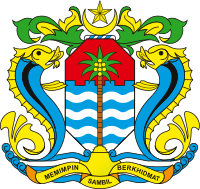Northeast Penang Island District
| Northeast Penang Island District | |||
|---|---|---|---|
| District of Malaysia | |||
| Other transcription(s) | |||
| • Malay | Daerah Timur Laut Pulau Pinang | ||
| • Chinese | 东北县 | ||
|
George Town, the capital city of Penang. | |||
| |||
|
Motto: Leading We Serve Memimpin Sambil Berkhidmat | |||
 Location of the Northeast Penang Island District within the state of Penang. | |||
| Country |
| ||
| State |
| ||
| Seat | George Town | ||
| Government | |||
| • Local Government | Penang Island City Council | ||
| • Mayor of Penang Island | Patahiyah Ismail | ||
| Area | |||
| • Total | 122.79 km2 (47.41 sq mi) | ||
| Elevation | 14 m (46 ft) | ||
| Population (2012) | |||
| • Total | 529,400[1] | ||
| • Density | 4,500/km2 (12,000/sq mi) | ||
| Time zone | MST (UTC+8) | ||
| • Summer (DST) | Not observed (UTC) | ||
| Postal code |
100xx to 108xx 111xx to 118xx | ||
| National calling code | +604 | ||
| License plate prefix | P | ||
| Website | http://www.mbpp.gov.my | ||
The Northeast Penang Island District is a district within the state of Penang, Malaysia. The district, which includes Penang's capital city, George Town, is the administrative, cultural and economic centre of Penang, as well as the Greater Penang Conurbation, the second largest metropolitan area in Malaysia.
First colonised by the British in 1786, the Northeast Penang Island District is now one of the most urbanised districts in Malaysia; George Town takes up most of the district. As one of the oldest cities in Malaysia, George Town has been inscribed as a UNESCO World Heritage Site since 2008. The district also covers some of the northernmost beaches of Penang Island and the central hill ranges of the island, including Penang Hill. The hills serve as a giant green lung for George Town.
The Northeast Penang Island District borders the Southwest Penang Island District to the southwest, which includes the Bayan Lepas Free Industrial Zone, the Penang International Airport and Balik Pulau. Both districts are administered by the Penang Island City Council.
Since its formation in 1786, George Town has been Malaysia's northern gateway. During the heyday of British rule, the Port of Penang served as an important entrepot for northern Malaya, exporting commodities such as spices, tin and rubber.[2][3][4] Today, George Town is a popular tourist attraction, Malaysia's centre of medical tourism and the country's northern financial centre.[5] It is also one of the top contributors of the nation's Gross Domestic Product and tax income.[6]
In recent years, George Town has earned worldwide acclaim by the likes of CNN,[7] The Guardian,[8] Forbes[9] and the Los Angeles Times.[10] George Town was also ranked the most liveable city in Malaysia and the 8th. most liveable Asian city by ECA International.[11]
History
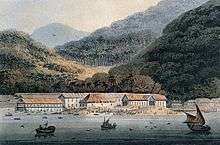
The modern history of Penang began in 1786, when Captain Francis Light of the British East India Company came ashore near the northeastern tip of Penang Island on 17 July that year. After signing an agreement with the Kedah Sultanate, forcing the latter to cede Penang Island into the hands of the British East India Company, Light returned to the island on 11 August and took formal possession of the island by the British East India Company "in the name of His Britannic Majesty, King George III".[12] The new settlement of George Town was created at the northeastern tip of Penang Island and named in honour of King George III.[13]
George Town grew rapidly as an entrepôt due to its strategic location and the booming spice production on Penang Island.[14][15][16] By the late 19th. century, the Port of Penang became one of the major entrepôts in British Malaya, exporting tin and rubber from the Malay Peninsula, along with the Port of Singapore.[17][18] The growth of the Port of Penang also brought in immigrants and traders from all over, including the Chinese, Malays, Indians, Peranakans, Eurasians, Thais, Arabs, Jews, Armenians and Germans.[19][20][21]
Penang Island was soon amalgamated with Singapore and Malacca into the Straits Settlements, of which George Town served as the capital between 1826 and 1832.[22] The Straits Settlements became a British crown colony in 1867.
Penang Island was subjugated by the Japanese Empire during World War II, before being recaptured by the British at war's end in 1945. In 1957, George Town became the first city within the Federation of Malaya and subsequently, Malaysia, as a result of a royal charter by Queen Elizabeth II. The whole of Penang Island was also granted city status by the Malaysian federal government in 2015.[23]
Urban Geography

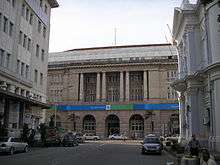
The heart of George Town consists of the 260-acre UNESCO World Heritage Site and more modern parts of the city centre, such as Komtar and Gurney Drive. The UNESCO World Heritage Site covers the oldest parts of the city that date all the way back to its founding in 1786, thereby predating most cities in Peninsular Malaysia and Singapore. Some of the more historic landmarks within the zone include Fort Cornwallis, City Hall, Queen Victoria Memorial Clock Tower, Kapitan Keling Mosque, Khoo Kongsi, Sri Mahamariamman Temple and St. George's Church.
Centuries of urbanisation has led to the outward sprawl of George Town, creating suburbs to the northwest, west and south. As a result, the entire eastern seaboard of Penang Island has been urbanised, as George Town's southernmost suburb, Gelugor, linked up with the town of Bayan Lepas, located at the southeastern part of the island and within the Southwest Penang Island District.
The suburbs of George Town are as listed below.
The district also covers much of Penang Island's central hill ranges. These hills serve as a major green lung for George Town and a forested water catchment area. In addition, Penang Hill, the tallest peak on Penang Island at 735 metres, is a major tourist attraction.
Governance

Local Government
Although districts in Malaysia were created for the purpose of land administration and revenue, in practice, it is the local government that ensures the provision of basic amenities and maintenance of urban infrastructure.
The Penang Island City Council, an agency under the Penang state government, is the local authority in charge of the entire Penang Island, including George Town. With a history dating back to 1800, it is the oldest local council in Malaysia and the successor to the country's first city council - the George Town City Council. Its headquarters is the City Hall in George Town, itself a colonial administrative landmark built in the 1900s.
The current Mayor of Penang Island is Patahiyah Ismail, who was appointed into the position by the Penang state government in 2015.[24] The Mayor's term lasts for two years.[25]

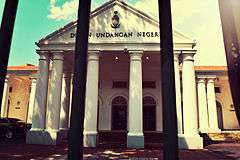
Electoral Constituencies
| Federal Constituency | Party | Member of Parliament | State Constituency | Party | State Assemblyman |
|---|---|---|---|---|---|
| Bukit Bendera (P048) | DAP | Zairil Khir Johari | Tanjong Bunga (N22) | DAP | Teh Yee Cheu |
| Air Puteh (N23) | DAP | Lim Guan Eng | |||
| Kebun Bunga (N24) | PKR | Cheah Kah Peng | |||
| Pulau Tikus (N25) | DAP | Yap Soo Huey | |||
| Tanjong (P049) | DAP | Ng Wei Aik | Padang Kota (N26) | DAP | Chow Kon Yeow |
| Pengkalan Kota (N27) | DAP | Lau Keng Ee | |||
| Komtar (N28) | DAP | Teh Lai Heng | |||
| Jelutong (P050) | DAP | Jeff Ooi Chuan Aun | Dato Keramat (N29) | DAP | Jagdeep Singh Deo |
| Sungai Pinang (N30) | DAP | Lim Siew Khim | |||
| Batu Lanchang (N31) | DAP | Law Heng Kiang | |||
| Bukit Gelugor (P051) | DAP | Ramkarpal Singh | Seri Delima (N32) | DAP | RSN Rayer |
| Air Itam (N33) | DAP | Wong Hon Wai | |||
| Paya Terubong (N34) | DAP | Yeoh Soon Hin | |||
| Bayan Baru (P052) | PKR | Sim Tze Tzin | Batu Uban (N35) | PKR | Jayabalan s/o Thambyappa |
Education
George Town is where some of the oldest schools in Malaysia were established. Penang Free School, founded in 1816, is the oldest English school in Southeast Asia, as well as the first of several missionary schools in the city. These English-medium schools, including St. Xavier's Institution, St. George's Girls School and Methodist Boys' School have produced some of Malaysia's most influential figures, including lawmakers, politicians, professionals and businessmen.
In addition, the first Chinese schools in Malaysia were established in George Town. Since then, Chinese schools like Chung Ling High School, Heng Ee High School and Penang Chinese Girls' High School have maintained strong reputations based on academic excellence.
International schools have also been established within the city to cater to the growing expatriate population. These schools offer primary to secondary education up to A Levels and International Baccalaureate.
In terms of tertiary education, the district is home to one of the best Malaysian public universities - Universiti Sains Malaysia, as well as several private colleges and institutions such as Wawasan Open University, SEGi College and Han Chiang College.
The Penang State Library operates a branch and a children's library in George Town.[26]
Health Care
In recent years, George Town has become the medical tourism centre of Malaysia, generating about 70% of the country's medical tourism revenue and attracting approximately half of medical tourist arrivals into the country.[27][28][29] The numerous public and private hospitals in the district, coupled with low cost of living and ease of travel have helped facilitate the medical tourism boom.
The Penang General Hospital is the main public hospital for George Town and the district. Built in 1882, it also serves as the reference hospital within northern Malaysia.[30]
Private hospitals, including Penang Adventist Hospital and Lam Wah Ee Hospital, also offer advanced facilities and speedier care by well-trained professionals. These hospitals cater not only to the local population but also patients from other states and neighbouring countries such as Indonesia and Singapore.[31]
Transportation

Land

The district is linked with the Malay Peninsula via the Penang Bridge, which runs between the George Town suburb of Gelugor and Perai on the mainland.
George Town has a relatively well-developed road network stretching back to the early days of British colonisation. Within the city centre are narrow streets and lanes, while modern arterial roads connect the city centre with the suburbs such as Tanjung Tokong, Air Itam and Jelutong.
The Jelutong Expressway, now renamed as Tun Dr Lim Chong Eu Expressway, runs along the eastern coastline of Penang Island between the city centre and the Penang International Airport, linking both locations with the Bayan Lepas Free Industrial Zone and the Penang Bridge.
Federal Route 6 is a winding trunk road that serves as the pan-island road, forming a circular loop round Penang Island. In the clockwise direction, this road connects George Town with Bayan Lepas, Balik Pulau and Teluk Bahang.
Public transportation throughout Penang Island is composed of buses operated by Rapid Penang. In recent years, a free shuttle service within the city centre and double decker buses for tourists have also been introduced.[32][33]
The district also has the only operational railway on Penang Island - the Penang Hill Railway. It is the oldest funicular rail system in Malaysia, having commenced operations in 1923. It was last upgraded in 2011 with new coaches that take as little as five minutes to reach the peak of Penang Hill.
Sea

The Port of Penang consists of four terminals, one of which is located in George Town. The Swettenham Pier at the northeastern tip of the city serves not only cruise ships, but also on occasion, warships as well.[34][35][36][37] As of 2014, Swettenham Pier recorded 1.2 million tourist arrivals and attracted some of the world's biggest cruise liners, such as the RMS Queen Mary 2.[38]
In addition, the Penang Ferry Service operates across the Penang Strait between George Town and Butterworth on the Malay Peninsula. At present, four ferries ply the route between George Town and Butterworth daily.
Tourist Attractions
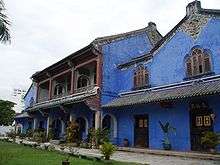
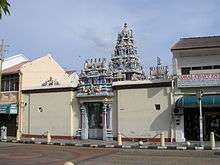
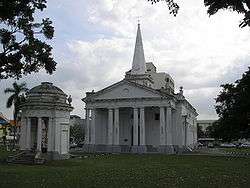
A great majority of Penang's tourist attractions lie within its capital city, George Town. The city, a UNESCO World Heritage Site, is well-renowned for its architectural, cultural and culinary varieties; George Town is also said to be the food capital of Malaysia. In addition, the city has a number of natural attractions ranging from the central hills of Penang Island to the sandy beaches along the island's northern coastline.
Listed below are just some of the landmarks within the Northeast Penang Island District.
See also
References
- ↑ http://penanginstitute.org/v3/resources/data-centre/122-population
- ↑ "When Penang became a Spice Island". Penang Monthly. 21 January 2016. Retrieved 15 October 2016.
- ↑ Wong, Yee Tuan (2015). Penang Chinese Commerce in the 19th Century: The Rise and Fall of the Big Five. Singapore: ISEAS-Yusof Ishak Institute. ISBN 9789814515023.
- ↑ Langdon, Marcus (2014). George Town's Historic Commercial and Civic Precints. Penang: George Town World Heritage Incorporated.
- ↑ "Penang accounts for 50% of medical tourists".
- ↑ "Lim: Penang is 'marginalised' in 11MP | theSundaily". www.thesundaily.my. Retrieved 16 October 2016.
- ↑ "Asia's 10 greatest street food cities".
- ↑ "Penang's Georgetown named No. 4 in Lonely Planet's list of top 10 cities for travel". The Straits Times.
- ↑ "Penang one of 2016's 'best budget travel destinations'".
- ↑ Los Angeles Times (26 December 2015). "Looking for a 2016 vacation? Here are 16 must-see destinations". latimes.com.
- ↑ "Penang one of 2016's 'best budget travel destinations'".
- ↑ III, Administrator. "History of Penang". www.visitpenang.gov.my. Retrieved 15 October 2016.
- ↑ Simon Richmond (2010). Malaysia, Singapore & Brunei. Lonely Planet. pp. 177–. ISBN 978-1-74104-887-2.
- ↑ "JourneyMalaysia » The Arrival of the British and East India Company ~ Pulau Pinang / Penang , Malaysia (Article)". www.journeymalaysia.com. Retrieved 15 October 2016.
- ↑ "When Penang became a Spice Island". Penang Monthly. 21 January 2016. Retrieved 15 October 2016.
- ↑ Khoo, Su Nin (2007). Streets of George Town, Penang. Penang: Areca Books. ISBN 9789839886009.
- ↑ Wong, Yee Tuan (2015). Penang Chinese Commerce in the 19th Century: The Rise and Fall of the Big Five. Singapore: ISEAS-Yusof Ishak Institute. ISBN 9789814515023.
- ↑ Langdon, Marcus (2014). George Town's Historic Commercial and Civic Precints. Penang: George Town World Heritage Incorporated.
- ↑ http://www.penangstory.net.my/mino-content-papermanecksha.html
- ↑ Nasution, Khoo Salma. More Than Merchants. Malaysia: Areca Books, 2006.
- ↑ http://www.thestar.com.my/news/community/2013/07/06/leaving-only-tombs-behind-the-jewish-community-in-penang-is-all-but-gone-with-the-death-of-its-last/
- ↑ "Singapore becomes admin centre of the Straits Settlements - Singapore History". eresources.nlb.gov.sg. Retrieved 15 October 2016.
- ↑ Looi Sue-Chern (24 March 2015). "George Town a city again". The Malaysian Insider. Archived from the original on 26 March 2015. Retrieved 24 January 2016.
- ↑ "Newbies pledge to give their best - Community | The Star Online". www.thestar.com.my. Retrieved 15 October 2016.
- ↑ "Organisation Chart". Official Portal of Penang Island City Council (MBPP). 9 October 2015. Retrieved 15 October 2016.
- ↑ "Penang Library Corporation".
- ↑ http://penangmonthly.com/medical-tourism-a-billion-ringgit-industry-for-penang/
- ↑ http://www.thesundaily.my/news/1260128
- ↑ "Higher Education in Regional and City Development : State of Penang, Malaysia". OECD.
- ↑ "Penang to have first-ever school in hospital". NST Online. Retrieved 18 October 2016.
- ↑ "Getting back its mojo". The Economist. 13 August 2011. ISSN 0013-0613. Retrieved 18 October 2016.
- ↑ "Penang – The Pearl of the Orient". Equator Academy of Art. Retrieved 27 July 2008.
- ↑ "Penang Hop-On Hop-Off".
- ↑ "Swettenham Pier Cruise Terminal". Penang Port.
- ↑ "Newspaper Article - S'pore gunboats call at Penang". eresources.nlb.gov.sg. Retrieved 18 October 2016.
- ↑ "Newspaper Article - S'pore gunboats call at Penang". eresources.nlb.gov.sg. Retrieved 18 October 2016.
- ↑ "US Navy ship calls at Penang - Community | The Star Online". www.thestar.com.my. Retrieved 18 October 2016.
- ↑ "Is Penang's tourism on the right track?". Penang Monthly. 1 October 2015. Retrieved 17 October 2016.
| Wikimedia Commons has media related to Northeast Penang Island. |

.svg.png)
